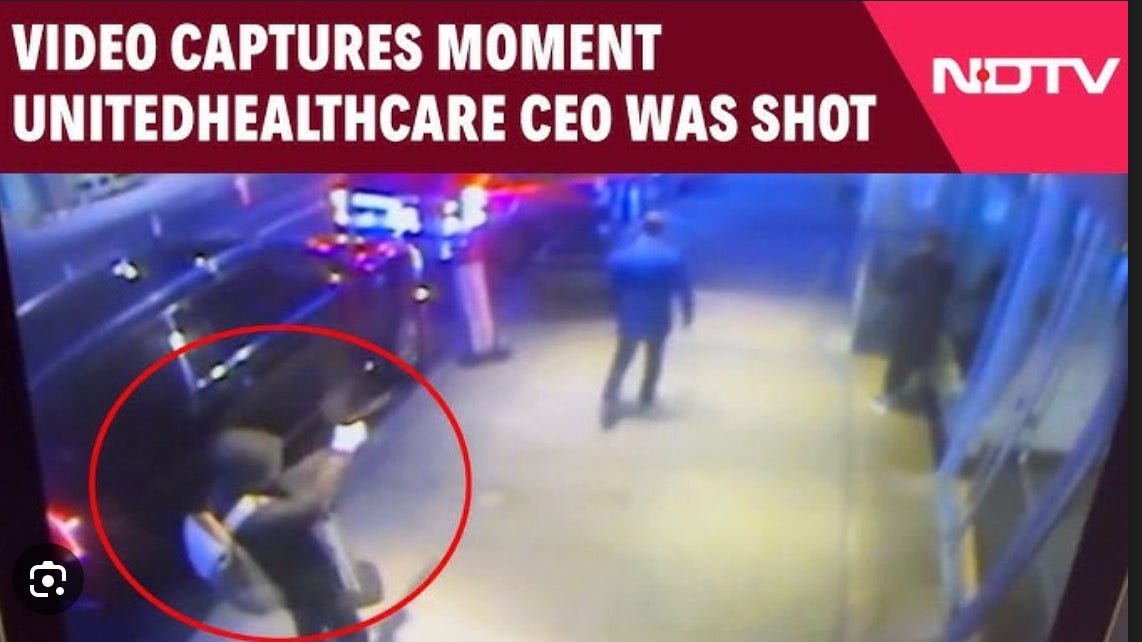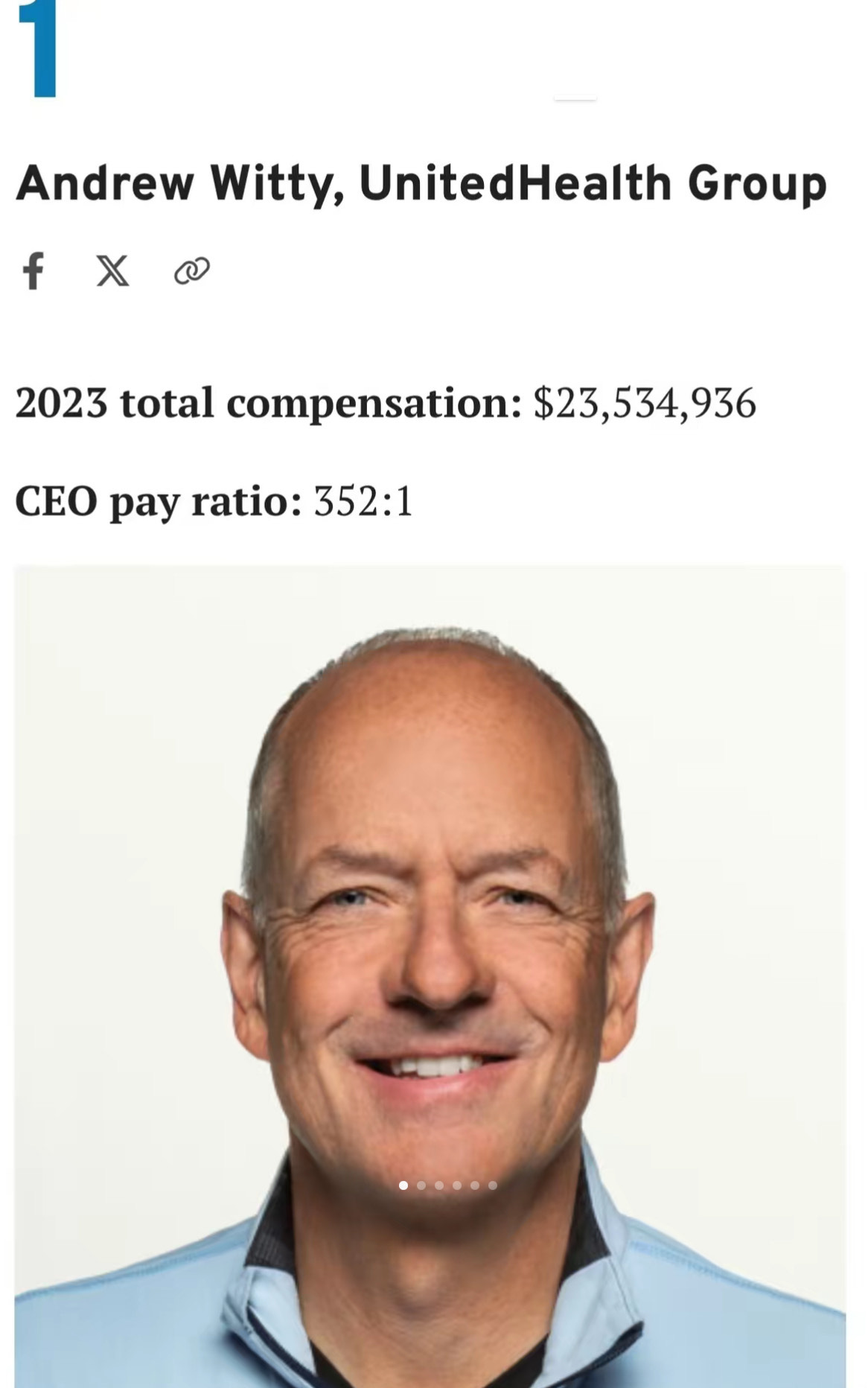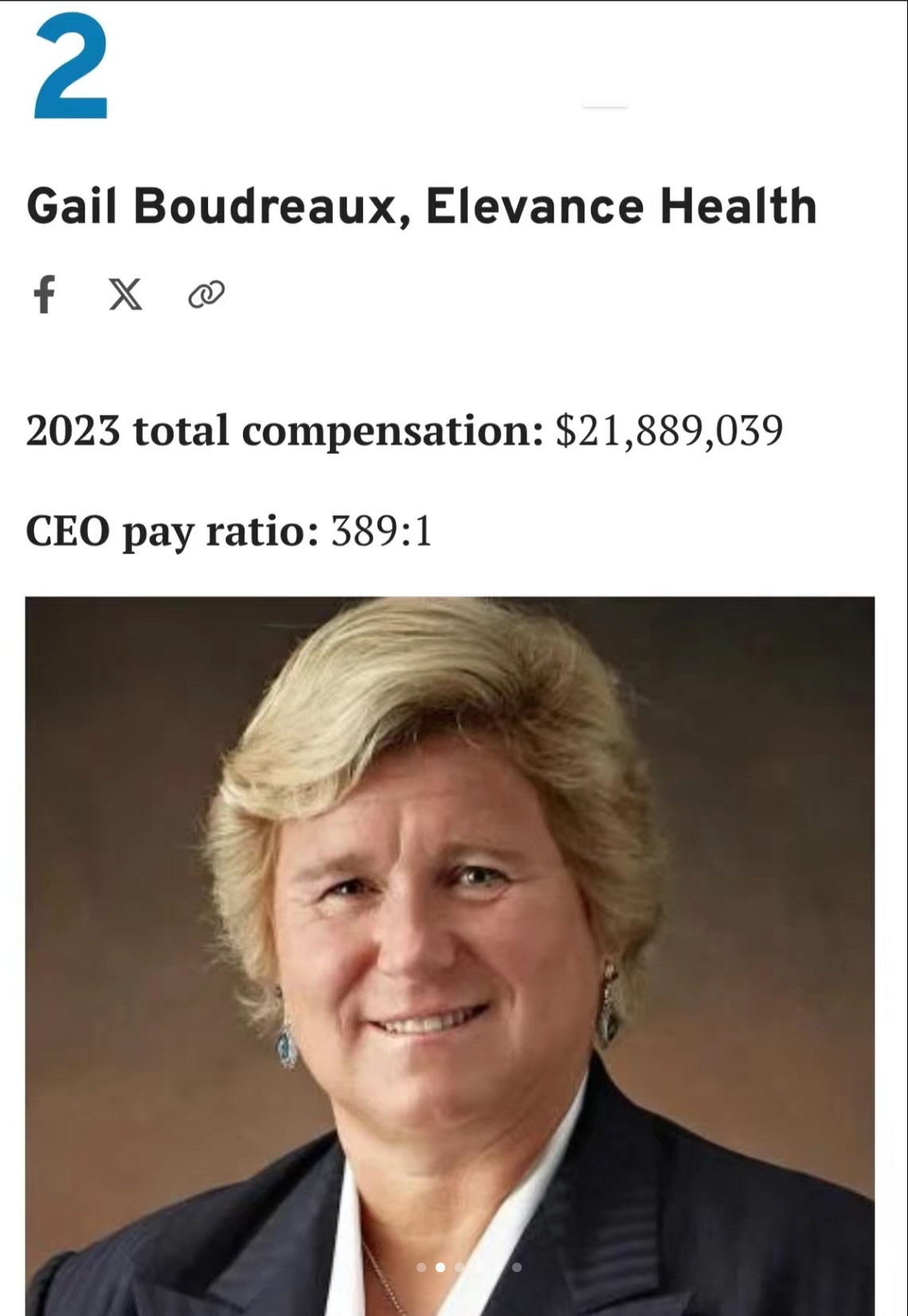The Consequences of Unchecked Power - Extractive Thinking #4.5
What UnitedHealth Care's CEO's Death Says About Inequality and Justice
When Leadership Meets Its Reckoning: An Indigenous Lens on Accountability and Change
I’ve added this piece to our current series on Extractive Thinking.
Because this event serves as a perfect example of how extractive thinking has played out and we can examine it.
Because if we are not examining and relearning from our mistakes on all scales, then why are we here?
To cause continuous harm or to create harmony?
The recent shooting of UnitedHealthcare’s CEO has ignited intense reactions across the spectrum—outrage, indifference, and even grim approval. This event, tragic as it is, forces us to confront deeper truths about how exploitative systems harm everyday people while protecting and enriching the few at the top. As we look at this reckoning, it’s clear: the time for transformative change is now.
From an Indigenous perspective, this moment calls for recalibration—realigning ourselves and our systems with harmony, equity, and a deep respect for life.
This post explores the layers of harm inflicted by corporate health care, the systemic extraction underlying it, and how we might collectively reclaim balance and justice.
The Event
The shooting of a CEO is not something to be taken lightly. Violence, while tempting for some to justify in desperate times, is never the ideal path to resolution. Yet, when leaders in positions of immense power repeatedly disregard the lives and well-being of others, the desperation of the people they harm becomes palpable.
For those grieving the CEO’s loss, it’s important to reflect on why so many are unwilling to mourn alongside you. The actions of health care executives—denying coverage, manipulating profits, and exploiting resources—have cost lives. Those who have lost loved ones due to these decisions have received no justice, no accountability.
The Known Details: Denied Coverage, Lives Lost
The outcry against corporate health care is not abstract. Millions of people have suffered or died because insurance companies denied them coverage for treatments, often citing costs or "ineligibility."
These are not isolated incidents—they are the result of deliberate, extractive practices that prioritize profits over human lives.
Families have watched loved ones die because they couldn’t afford life-saving procedures. Patients have been forced to choose between bankruptcy and survival. Meanwhile, the executives behind these systems live in unimaginable wealth, shielded from the consequences of their decisions.
When some say they are not mourning this CEO’s death, it is because no one mourned their loved ones, whose deaths were caused by these same systems.
Wealth That is Extractive in Every Way
Here is who sits in leadership now:
The top 3 CEOs in HealthCare
The DOJ Investigation: Foul Play in the Boardroom
The DOJ is investigating allegations of fraud and insider trading within UnitedHealthcare’s leadership. Reports suggest that executives used insider knowledge to manipulate stock prices, selling shares at peak value before the company’s financial realities became public.
This isn’t just unethical—it’s illegal.
It’s theft, not just from shareholders but from the millions of patients and providers already struggling under the weight of an inequitable system.
When those entrusted with leading exploitative systems also break the laws they’re supposed to uphold, it’s no wonder people feel justice has failed them.
Unfair Salaries and CEO Compensation
The disparity in health care is starkly illustrated by CEO compensation. In the United States, health care executives earn salaries up to 353% higher than anyone else in their companies, with total compensation often reaching tens of millions annually.
These salaries represent not just inequality but the stark reality of extraction. That wealth is built on denied claims, unpaid providers, and rising insurance premiums. It’s not earned—it’s taken.
Here are the other two in the top 3:
This level of excess, especially in a sector dedicated to health and well-being, raises an important question: How much harm are we willing to tolerate so a handful of individuals can live in unimaginable luxury?
The Root Cause: Extraction
At its core, this issue is about extraction—taking more than is sustainable or fair, whether from people, communities, or nature.
This mindset isn’t confined to health care; it permeates every facet of our systems, from agriculture to energy to education.
From an Indigenous perspective, this imbalance is a sign of a deeper disconnection.
Extractive actions disrupt harmony with the natural world and each other, creating systems where suffering becomes the norm.
The solution isn’t to abandon progress but to redefine it—to find ways of living and leading that align with mutual benefit and respect for all life.
A Path Forward: Recalibration Through an Indigenous Lens
The answer begins with us.
Change starts by recognizing where we contribute to these systems, both individually and collectively.
It requires courage to admit our complicity and a commitment to creating solutions that operate outside the boundaries established by the 1%.
Recalibrating ourselves with an Indigenous lens means rejecting extractive behaviors and reimagining progress as harmony. This doesn't mean regression or giving up modern advancements; it means aligning them with respect for people, communities, and the Earth.
We need to build new systems of support, starting locally and expanding globally.
Let us learn from other nations like South Korea, which has innovated collective solutions for health care, or France and Georgia, which have demonstrated the power of protest and solidarity.
The Wake-Up Call
This event is not just a tragedy; it’s a reckoning.
The 1% can no longer assume their power is untouchable.
For those of us outside their sphere, it’s a reminder that the time for change is now.
If your first reaction is to find fault with these suggestions, I invite you to pause.
Instead of focusing on disagreement, ask yourself:
How will we create new ways to support each other?
What steps can we take to build a system that prioritizes equity, health, and harmony?
The path forward is not simple, but it is necessary.
This is our wake-up call—will we answer it?
How Can We Make Better Decisions?
What Can You Do?
The first step in dismantling broken systems is recalibrating how we make decisions—individually and collectively. Change begins with you, and it requires intentional, thoughtful action.
That’s why I’m inviting you to join the next 5-Week Decision-Making Quest in January or February.
This immersive experience is designed to help you rewire how you approach decisions, align your actions with your values, and empower you to be a force for change in your own life and community.
By enrolling now, you’re not just investing in your growth—you’re supporting the work of an independent creator navigating the same challenges we all face in a volatile world. Just as colleagues searching for jobs are serenading stability, I, too, start at ground zero each month, seeking clients and subscribers to continue sharing this vital work.
Together, we can reshape how we make choices, challenge systems, and create new possibilities.
Will you join me on this journey?
Sign Up Here (click)
Yes, Here is what is in the Whole Extraction Thinking Series
You’ve read part 4.5 of a 5-part series-free-my gift
How will we approach »»» Reclaiming Balance and who is willing to face the consequences of extractive thinking in a world of shared resources?
This is a 5 part series for Leaders + Learners where you and I take an honest look at “What is Extractive Thinking?”
Here is a succinct outline of what you can expect in this first of five posts in this series here on Verbal Vortexes.
Thank you for joining me and my mind-heart-gut approach to where we can do the work both internally (with our inner game) and externally (our expression the outer game)
What’s Extraction
The Indigenous Circle: A Framework for Balance
Consequences of Extractive Thinking
Extractive Thinking in Leadership
The Consequences of Unchecked Power- (added new real-life event post to demonstrate how extractive thinking plays out now as a post between 4-5)
Restoring the Balance: Lessons from Indigenous Wisdom
Practical Action + Conclusion
A gentle reminder, this body of work you are reading and listening to here on Verbal Vortexes is produced from Dyslexic Thinking. What do you know or remember learning with me about Dyslexic Thinking?
Share with me in the comments below.
RESTORATION IN ACTION
Part of restoration is recognizing and paying for emotional and intellectual labor instead of only honoring physical labor.
The first in this series is free. You can read it here.
You are asked to become a paid member to access the rest of this post and the rest of the series.
Those who honor and take action to rebalance reciprocity are appreciated.
P.S. Founder Members receive a 1-on-1 session with me and all my written guides + workbooks.
Founding Members receive ALL the Guides + Workbooks created in 2024.
The goal is to work with you to implement what you learn in the writing offered here in Verbal Vortexes.
The above Impact Guide is a gift to all NEW Subscribers in October. It is a robust 89-page guide using a brain-friendly combination of images and data so that you can work with it and implement it immediately.
The "Post-Pandemic Decision-Making" Impact Guide is an invaluable, brain-friendly resource designed to empower readers in the new normal. Spanning 89 pages, this hybrid guidebook offers:
Inclusive learning: Catering to all types of learners and thinkers, ensuring everyone benefits from its wisdom.
Thought-provoking content: Challenging your current thinking and encouraging exploration of fresh ideas and a whole new set of questions.
Brain-friendly design: Easy-to-digest information that makes learning effortless and enjoyable.
Relevance: A focus on post-pandemic decision-making, addressing the unique challenges and opportunities of our changing world.
Ultimately, the "Post-Pandemic Decision-Making" Impact Guide is an essential tool for anyone looking to navigate the complexities of decision-making in today's rapidly evolving landscape.












Kulkofsky et al. (2011) found that flashbulb memories (FBMs)—vivid, detailed memories of significant events—are shaped differently in individualistic versus collectivistic cultures. In individualistic cultures, personal involvement and emotional salience drive FBM formation, while in collectivistic cultures, the social and communal relevance of the event plays a larger role in how it impacts them.
Michele Price this incident —- real life consequence of unchecked power, made me think of a study published in 2011 that I think is interesting in trying to figure out the brains we are making in American society.
The resignation and detachment described in your Substack article is a reframe of how we,in the westernized competative framework value celebrating the individual during wins instead of looking at all the people, places and environments that were shared to get them in that moment.
What most activists are trying to do is to induce a majority shift towards a communal reframing of systemic issues.
This could involve:
💡Highlighting the shared impact of corporate greed across diverse demographics.
💡Building collective narratives that connect individual experiences with broader societal consequences, encouraging communal memory formation.
💡Drawing from collectivistic cultural strategies (e.g., framing corporate accountability as a shared societal value) to counteract the individualistic tendencies that foster apathy.
Yet maybe we need to start believing, behaving and serving as if the global majority, that has been hurt by an actual minority of greed, doesn’t need the top 3-5% to agree or help to get the shift done?